Unlocking the Power of Seeds: 10 Varieties for Weight Loss and Health Benefits
Unlocking the Power of Seeds: 10 Varieties for Weight Loss and Health Benefits
Introduction:
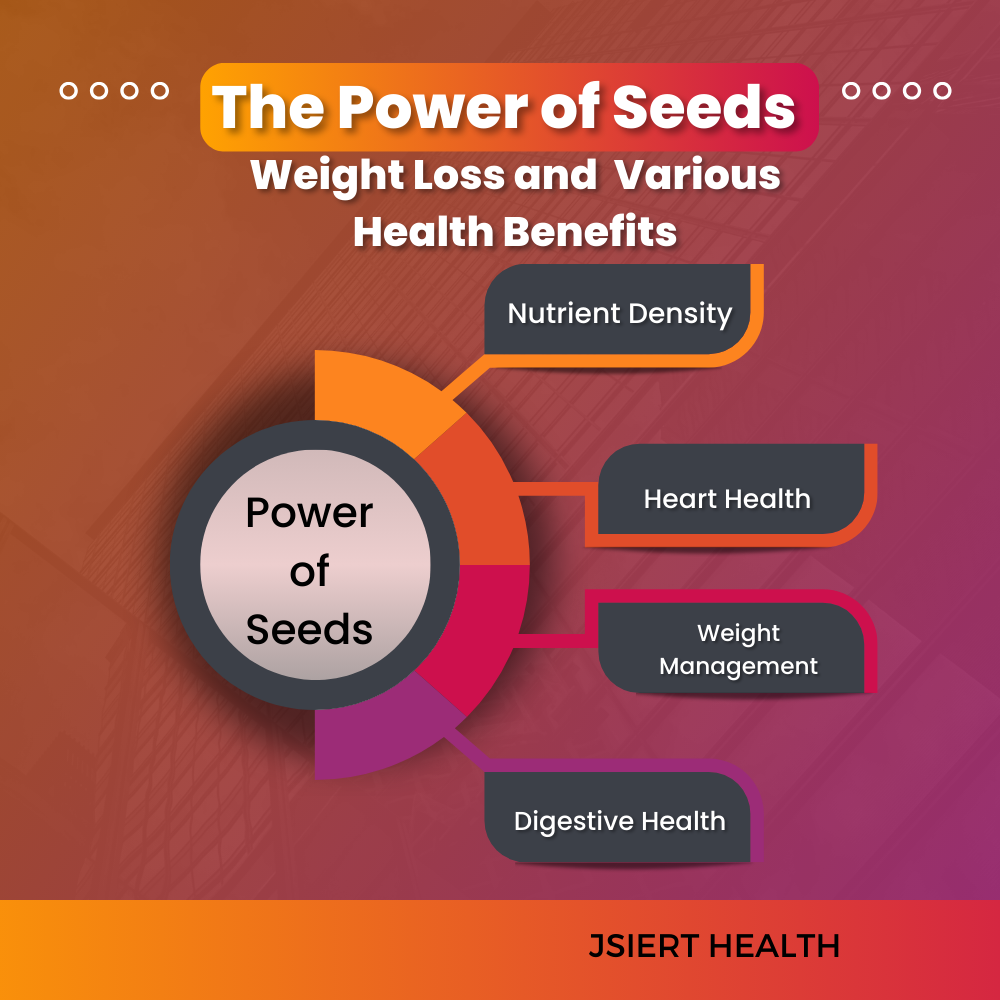
Seeds are often overlooked in the realm of nutrition, yet they are veritable powerhouses of essential nutrients, offering a plethora of health benefits. In this comprehensive guide, we delve into the nutritional profiles, health advantages, and practical ways to integrate 10 different seeds into your diet for weight loss and overall well-being.
Chia Seeds:
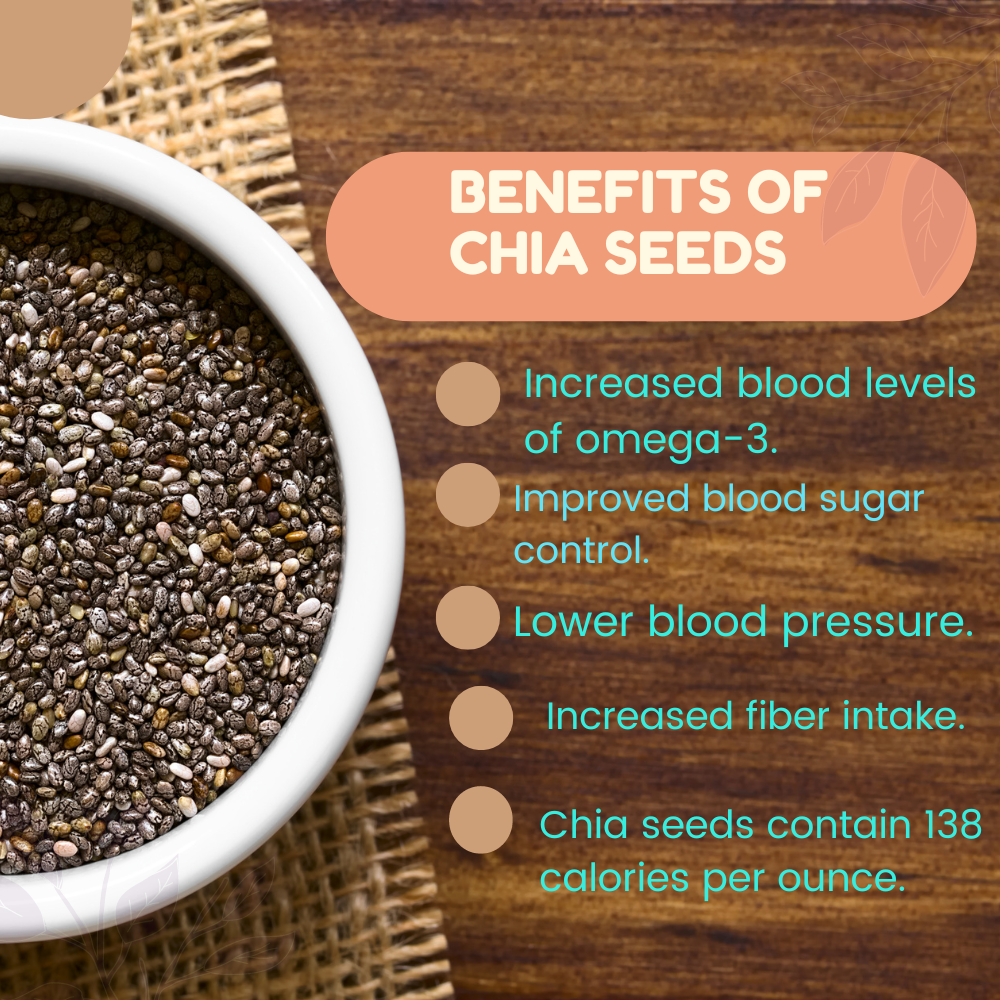
Nutritional Profile:
- Omega-3 Fatty Acids: Chia seeds are one of the richest plant-based sources of omega-3 fatty acids, specifically alpha-linolenic acid (ALA). Omega-3s are essential fats that support heart health, brain function, and reduce inflammation.
- Fiber: Chia seeds are exceptionally high in dietary fiber, with a combination of soluble and insoluble fiber. This fiber content supports digestive health, regulates bowel movements, and promotes a feeling of fullness, which can aid in weight management.
- Protein: Despite being small in size, chia seeds pack a decent amount of protein, making them a valuable plant-based protein source for vegetarians and vegans. Protein is essential for muscle repair, growth, and overall body function.
- Antioxidants: Chia seeds contain various antioxidants, including flavonoids, quercetin, and caffeic acid, which help neutralize free radicals and protect cells from oxidative damage.
- Minerals: Chia seeds are rich in minerals such as calcium, magnesium, phosphorus, and manganese. Calcium is vital for bone health, magnesium supports muscle function and energy production, while phosphorus is involved in bone and teeth formation, and manganese acts as a cofactor for various enzymes involved in metabolism.
Health Benefits:
- Weight Management: The combination of fiber, protein, and healthy fats in chia seeds promotes satiety and helps regulate appetite, making them an excellent addition to a weight loss or weight management diet.
- Heart Health: Omega-3 fatty acids in chia seeds help reduce LDL (bad) cholesterol levels, triglycerides, and blood pressure, thereby lowering the risk of heart disease and stroke.
- Blood Sugar Control: The soluble fiber in chia seeds forms a gel-like substance when mixed with water, slowing down the absorption of sugar and carbohydrates in the digestive tract. This can help stabilize blood sugar levels and improve insulin sensitivity, making chia seeds beneficial for individuals with diabetes or insulin resistance.
- Hydration: When soaked in water, chia seeds absorb liquid and develop a gel-like texture. This property helps maintain hydration and electrolyte balance in the body, making chia seeds a popular choice among athletes for pre- or post-workout hydration.
- Bone Health: Chia seeds are an excellent source of calcium, magnesium, and phosphorus, all of which are essential for maintaining strong and healthy bones. Regular consumption of chia seeds can contribute to bone density and reduce the risk of osteoporosis.
How to Incorporate Chia Seeds into Your Diet:
- Chia Pudding: Mix chia seeds with your choice of milk (such as almond, coconut, or dairy milk), sweetener, and flavorings (like vanilla extract or cocoa powder). Let it sit in the refrigerator overnight to thicken into a pudding-like consistency.
- Smoothies: Add a tablespoon or two of chia seeds to your favorite smoothie recipe for an extra nutritional boost and thicker texture.
- Oatmeal or Yogurt Toppings: Sprinkle chia seeds over oatmeal, yogurt, or cereal for added crunch, fiber, and protein.
- Baking: Incorporate chia seeds into baked goods like muffins, bread, or energy bars for a nutritious twist.
Flaxseeds:
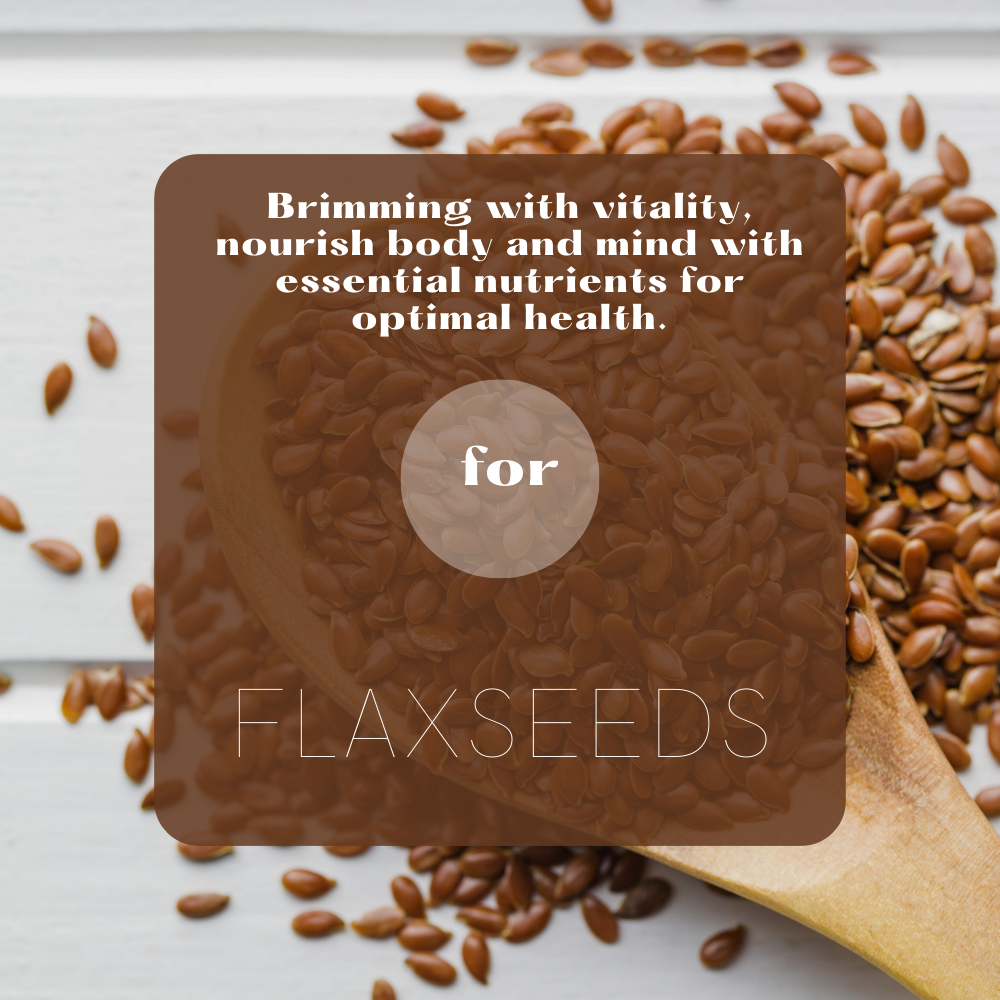
Nutritional Profile:
- Omega-3 Fatty Acids: Flaxseeds are one of the richest plant-based sources of alpha-linolenic acid (ALA), a type of omega-3 fatty acid. ALA is converted in the body into EPA and DHA, the active forms of omega-3s, which play crucial roles in heart health, brain function, and inflammation regulation.
- Lignans: Flaxseeds are abundant in lignans, which are plant compounds with antioxidant and estrogen-like properties. Lignans have been associated with various health benefits, including reduced risk of cancer, improved heart health, and hormonal balance.
- Fiber: Flaxseeds are high in soluble and insoluble fiber, which promotes digestive health, regulates bowel movements, and helps maintain stable blood sugar levels. The mucilage content in flaxseeds forms a gel-like substance when mixed with water, aiding digestion and promoting a feeling of fullness.
- Protein: Flaxseeds contain a moderate amount of protein, making them a valuable addition to vegetarian and vegan diets. Protein is essential for muscle repair, growth, and overall body function.
- Vitamins and Minerals: Flaxseeds provide small amounts of essential vitamins and minerals, including vitamin B1 (thiamine), vitamin B6, magnesium, phosphorus, and manganese. These nutrients play various roles in metabolism, energy production, and bone health.
Health Benefits:
- Heart Health: The omega-3 fatty acids and lignans in flaxseeds contribute to heart health by lowering LDL (bad) cholesterol levels, reducing inflammation, and improving blood vessel function. Regular consumption of flaxseeds has been associated with a reduced risk of heart disease and stroke.
- Cancer Prevention: Lignans in flaxseeds have antioxidant and estrogen-like properties that may help reduce the risk of hormone-related cancers, such as breast, prostate, and colon cancer. Lignans may also inhibit the growth of cancer cells and promote their destruction.
- Digestive Health: The high fiber content in flaxseeds supports digestive health by promoting regular bowel movements, preventing constipation, and reducing the risk of digestive disorders like diverticulitis. The mucilage formed by flaxseeds helps soothe the digestive tract and alleviate symptoms of irritable bowel syndrome (IBS).
- Blood Sugar Control: The soluble fiber in flaxseeds slows down the absorption of sugar and carbohydrates in the digestive tract, leading to more stable blood sugar levels. This can be beneficial for individuals with diabetes or insulin resistance, helping to improve glycemic control and reduce the risk of complications.
- Inflammation Reduction: Omega-3 fatty acids in flaxseeds have anti-inflammatory properties, which may help reduce inflammation in the body and alleviate symptoms of inflammatory conditions such as arthritis, asthma, and inflammatory bowel disease (IBD).
How to Incorporate Flaxseeds into Your Diet:
- Ground Flaxseeds: Grinding flaxseeds increases their digestibility and allows for better absorption of nutrients. Add ground flaxseeds to smoothies, oatmeal, yogurt, or baked goods like muffins, pancakes, and bread.
- Flaxseed Oil: Use flaxseed oil as a salad dressing or drizzle it over cooked vegetables to add a nutty flavor and boost omega-3 intake.
- Flaxseed Meal: Mix flaxseed meal into cereal, soups, or casseroles to increase fiber content and add texture.
- Flax Egg: Combine ground flaxseeds with water to create a vegan egg substitute for baking. Use one tablespoon of ground flaxseeds mixed with three tablespoons of water to replace one egg in recipes.
Hemp Seeds:
- Nutritional Profile:
- Hemp seeds are packed with essential nutrients, making them a nutritional powerhouse.
- They are an excellent source of plant-based protein, containing all nine essential amino acids necessary for human health.
- Rich in healthy fats, particularly omega-3 and omega-6 fatty acids, in an optimal ratio for human consumption.
- High in fiber, aiding digestion and promoting feelings of fullness.
- Loaded with vitamins and minerals, including vitamin E, magnesium, phosphorus, potassium, iron, and zinc.
- Health Benefits:
- Heart Health: The balance of omega-3 and omega-6 fatty acids in hemp seeds may support cardiovascular health by reducing inflammation, lowering blood pressure, and improving cholesterol levels.
- Weight Management: The combination of protein, healthy fats, and fiber in hemp seeds can promote satiety, making them beneficial for weight loss or weight management efforts.
- Muscle Health: Hemp seeds are rich in protein, making them valuable for muscle building and repair, especially for individuals leading an active lifestyle or participating in regular exercise.
- Skin and Hair: The high content of vitamin E in hemp seeds provides antioxidant properties that may benefit skin health, promoting cell regeneration and protecting against free radical damage. They may also contribute to healthy hair growth and appearance.
- Immune Support: Hemp seeds contain various vitamins and minerals that support overall immune function, helping the body defend against infections and diseases.
- How to Incorporate Hemp Seeds into Your Diet:
- Smoothies: Add a tablespoon or two of hemp seeds to your favorite smoothie recipe for an extra boost of protein, healthy fats, and nutrients.
- Yogurt or Oatmeal: Sprinkle hemp seeds over yogurt, oatmeal, or cereal to add texture and nutrition.
- Salads: Sprinkle hemp seeds over salads for a crunchy texture and nutty flavor, or blend them into salad dressings for added creaminess and nutrition.
- Baking: Incorporate hemp seeds into baked goods such as muffins, bread, or cookies for added protein and a nutty flavor.
- Snacks: Enjoy hemp seeds as a standalone snack or mix them with nuts, dried fruits, or dark chocolate for a nutritious trail mix.
- Hemp Milk: Use hemp seeds to make homemade hemp milk by blending them with water and straining the mixture through a nut milk bag or cheesecloth. Hemp milk can be used as a dairy-free alternative in various recipes or enjoyed on its own.
Pumpkin Seeds:
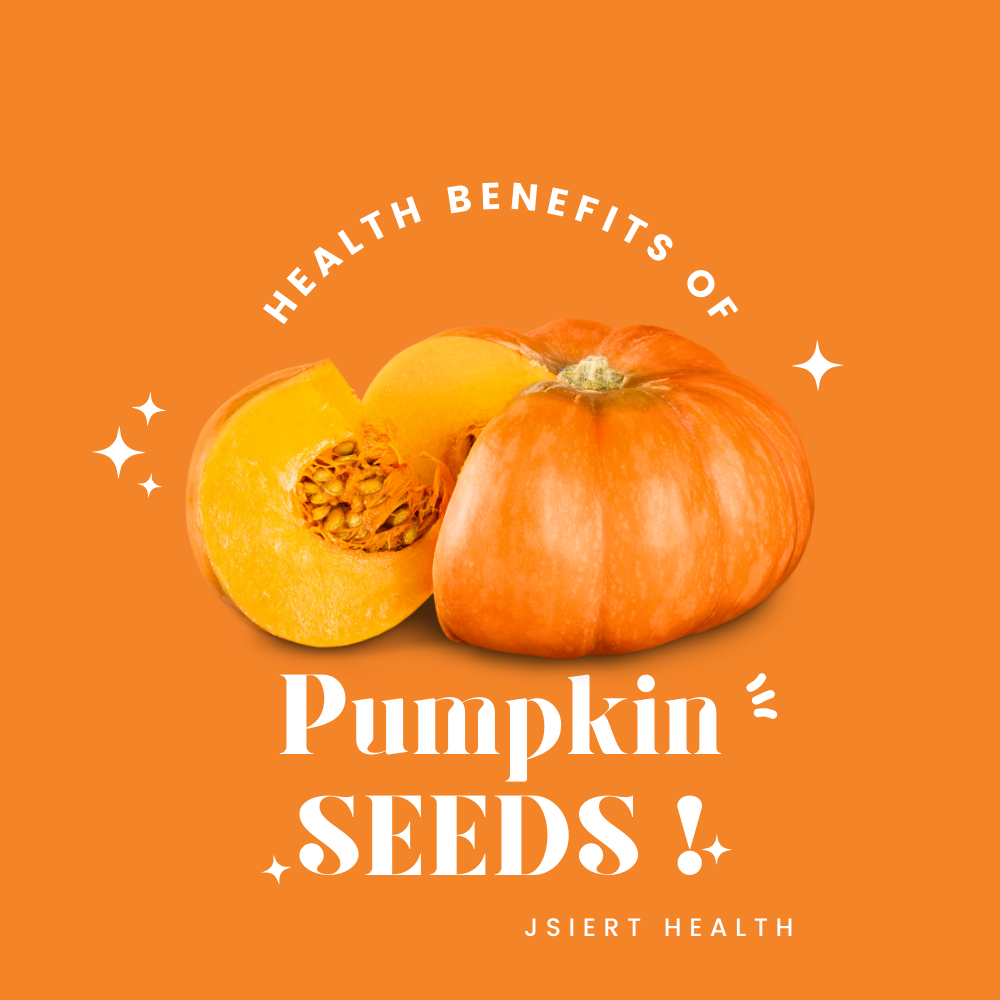
- Nutritional Profile:
- Pumpkin seeds are nutrient-dense, containing a variety of essential vitamins, minerals, and antioxidants.
- They are an excellent source of magnesium, zinc, iron, and manganese, which are important for various bodily functions including bone health, immune function, and energy production.
- High in protein and healthy fats, providing a satisfying snack option.
- Rich in antioxidants like vitamin E and phenolic acids, which help protect cells from damage caused by free radicals.
- Health Benefits:
- Heart Health: The magnesium and omega-3 fatty acids in pumpkin seeds may help lower blood pressure and improve heart health. They can also help lower cholesterol levels and reduce the risk of heart disease.
- Bone Health: Pumpkin seeds are a good source of magnesium, which is essential for bone formation and strength. Adequate magnesium intake may help prevent osteoporosis and maintain bone density.
- Immune Support: The zinc content in pumpkin seeds plays a crucial role in immune function. Consuming pumpkin seeds regularly may help support a healthy immune system and reduce the risk of infections.
- Prostate Health: Some research suggests that pumpkin seeds may help improve prostate health and reduce the risk of benign prostatic hyperplasia (BPH) in men due to their high zinc content.
- Mood and Sleep: Pumpkin seeds contain tryptophan, an amino acid that helps promote relaxation and improve mood. Additionally, the magnesium content may help regulate sleep patterns and improve sleep quality.
- How to Incorporate Pumpkin Seeds into Your Diet:
- Snacking: Enjoy pumpkin seeds as a standalone snack or mix them with other nuts and dried fruits for a nutritious trail mix.
- Salads: Sprinkle roasted pumpkin seeds over salads to add crunch and flavor. They pair well with leafy greens, roasted vegetables, and vinaigrette dressings.
- Soups and Stews: Add pumpkin seeds as a garnish to soups and stews for extra texture and nutrition. They can also be blended into creamy soups for added creaminess and flavor.
- Baking: Incorporate pumpkin seeds into baked goods such as bread, muffins, and cookies. They add a nutty flavor and crunchy texture to baked treats.
- Smoothie Toppings: Sprinkle pumpkin seeds on top of smoothie bowls or blend them into smoothies for added protein and healthy fats.
- Pumpkin Seed Butter: Make homemade pumpkin seed butter by blending roasted pumpkin seeds until smooth. Use it as a spread on toast, crackers, or fruit slices for a nutritious snack.
Sunflower Seeds:
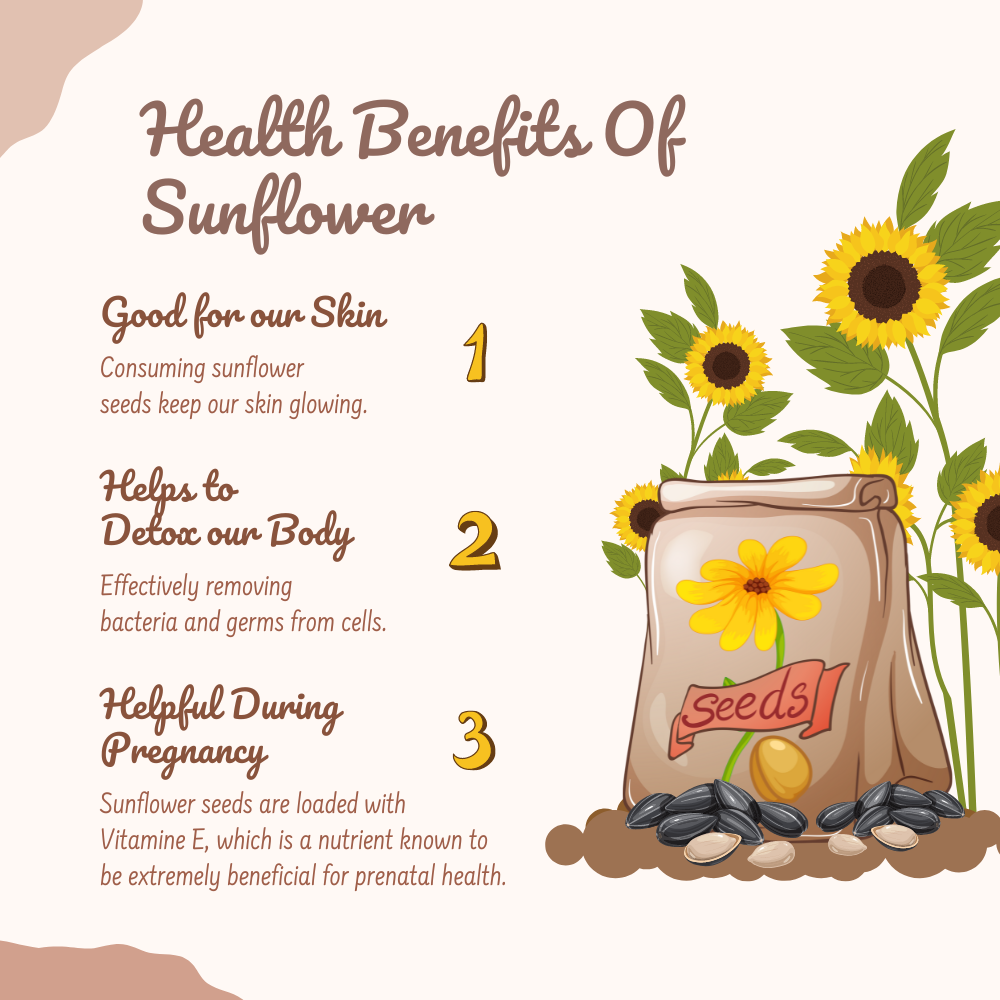
- Nutritional Profile:
- Sunflower seeds are packed with essential nutrients, making them a nutritious addition to your diet.
- They are an excellent source of healthy fats, including monounsaturated and polyunsaturated fats, which are beneficial for heart health.
- Rich in protein, providing essential amino acids necessary for muscle repair and growth.
- High in fiber, which aids in digestion, promotes satiety, and helps regulate blood sugar levels.
- Sunflower seeds are a good source of vitamins and minerals, including vitamin E, magnesium, selenium, and copper.
- Health Benefits:
- Heart Health: The healthy fats and antioxidants in sunflower seeds may help lower cholesterol levels, reduce inflammation, and support overall heart health.
- Weight Management: The combination of protein, healthy fats, and fiber in sunflower seeds can help promote feelings of fullness and satiety, making them a valuable addition to weight loss or weight management diets.
- Skin Health: Sunflower seeds are rich in vitamin E, an antioxidant that helps protect skin cells from damage caused by free radicals and UV radiation. Regular consumption may contribute to healthy, radiant skin.
- Bone Health: Sunflower seeds contain minerals like magnesium, phosphorus, and copper, which are essential for bone formation and maintenance. Incorporating sunflower seeds into your diet may help support strong and healthy bones.
- Mood Enhancement: Sunflower seeds contain tryptophan, an amino acid that the body converts into serotonin, a neurotransmitter associated with mood regulation. Consuming sunflower seeds may help improve mood and reduce symptoms of depression and anxiety.
- How to Incorporate Sunflower Seeds into Your Diet:
- Snacking: Enjoy sunflower seeds as a convenient and nutritious snack on their own or mixed with other nuts and dried fruits.
- Salads: Sprinkle roasted sunflower seeds over salads to add crunch and texture. They pair well with leafy greens, vegetables, and salad dressings.
- Trail Mix: Combine sunflower seeds with nuts, dried fruits, and whole grain cereal to create a homemade trail mix for a satisfying snack on-the-go.
- Baking: Incorporate sunflower seeds into baked goods such as bread, muffins, and cookies for added texture and nutrition. They can be mixed into the dough or sprinkled on top before baking.
- Smoothie Toppings: Blend sunflower seeds into smoothies for added protein, healthy fats, and a creamy texture. They pair well with fruits like bananas, berries, and mangoes.
- Sunflower Seed Butter: Make homemade sunflower seed butter by blending roasted sunflower seeds until smooth. Use it as a spread on toast, crackers, or fruit slices for a nutritious snack.
Sesame Seeds:
- Nutritional Profile:
- Sesame seeds are tiny but packed with essential nutrients, making them a valuable addition to your diet.
- They are an excellent source of healthy fats, including monounsaturated and polyunsaturated fats, which are beneficial for heart health.
- Rich in protein, providing essential amino acids necessary for muscle repair and growth.
- High in dietary fiber, which aids in digestion, promotes satiety, and helps regulate blood sugar levels.
- Sesame seeds are a good source of vitamins and minerals, including calcium, magnesium, iron, zinc, and vitamin E.
- Health Benefits:
- Bone Health: Sesame seeds are rich in calcium, a mineral essential for bone health and strength. Incorporating sesame seeds into your diet may help prevent osteoporosis and support overall bone health.
- Heart Health: The healthy fats and antioxidants in sesame seeds may help lower cholesterol levels, reduce inflammation, and support cardiovascular health.
- Blood Pressure Regulation: Sesame seeds contain magnesium, a mineral that plays a crucial role in blood pressure regulation. Consuming sesame seeds regularly may help lower blood pressure levels and reduce the risk of hypertension.
- Antioxidant Properties: Sesame seeds contain lignans and other antioxidants that help neutralize free radicals and protect cells from damage caused by oxidative stress. Regular consumption may help reduce the risk of chronic diseases such as cancer and heart disease.
- Skin Health: Sesame seeds are rich in vitamin E, an antioxidant that helps protect skin cells from damage and promotes healthy, glowing skin.
- How to Incorporate Sesame Seeds into Your Diet:
- Topping: Sprinkle sesame seeds on top of salads, stir-fries, soups, or roasted vegetables for added texture, flavor, and nutrition.
- Sesame Paste or Tahini: Use sesame paste, also known as tahini, as a base for sauces, dressings, dips, or spreads. Tahini can be mixed with lemon juice, garlic, and olive oil to make a delicious and creamy dressing for salads or drizzled over grilled meats and vegetables.
- Baking: Incorporate sesame seeds into baked goods such as bread, muffins, cookies, or granola for added crunch and nutty flavor. They can be mixed into the dough or sprinkled on top before baking.
- Sesame Oil: Use sesame oil for cooking or as a flavor enhancer in stir-fries, marinades, sauces, and dressings. It adds a rich, nutty flavor to dishes and complements a wide range of cuisines.
- Sesame Snacks: Enjoy sesame seeds as a snack on their own or mixed with other nuts and dried fruits. Toasted sesame seeds can be seasoned with salt or spices for added flavor.
- Sesame-Crusted Foods: Coat fish, chicken, or tofu with sesame seeds before cooking to create a flavorful crust. This adds texture and enhances the taste of the dish.
Pomegranate Seeds:
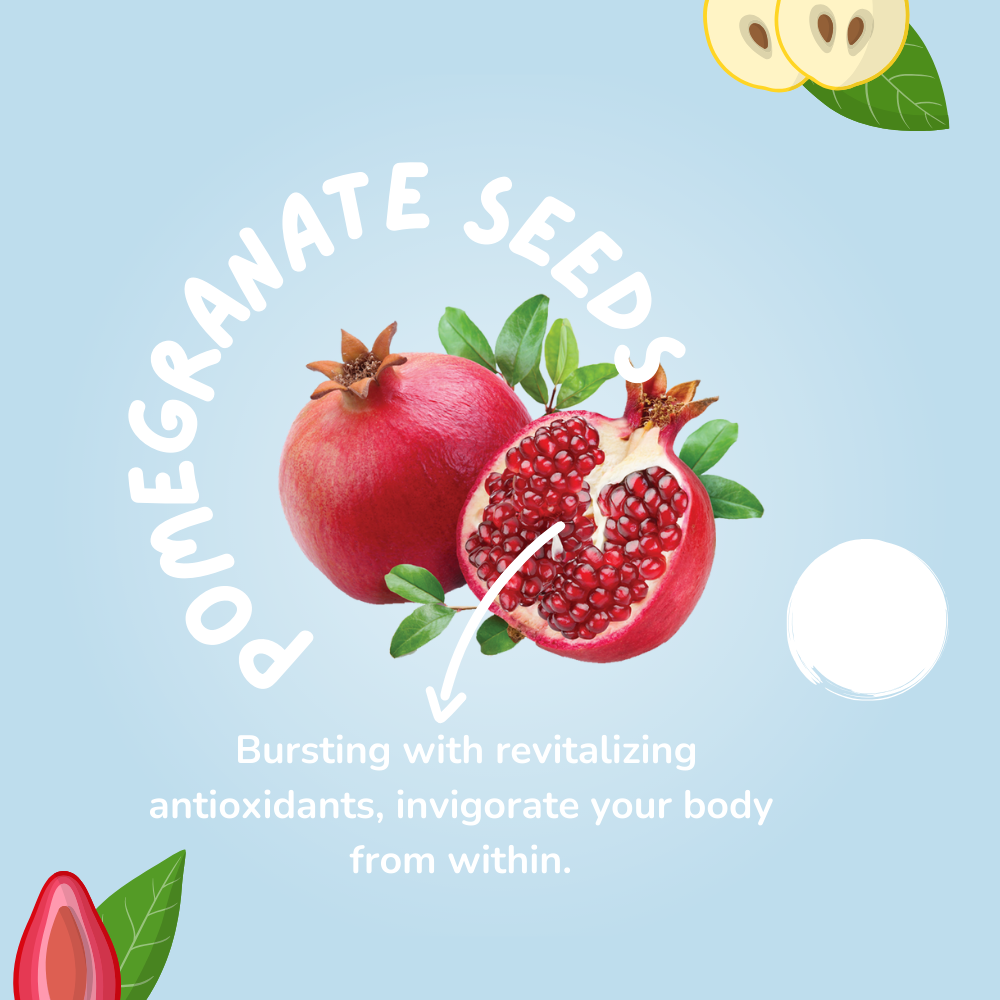
- Nutritional Profile:
- Pomegranate seeds are packed with essential nutrients, making them a nutritious addition to your diet.
- They are rich in antioxidants, particularly punicalagins and anthocyanins, which help protect cells from damage caused by free radicals.
- High in dietary fiber, which aids in digestion, promotes satiety, and helps regulate blood sugar levels.
- Pomegranate seeds are a good source of vitamins and minerals, including vitamin C, vitamin K, potassium, and folate.
- Health Benefits:
- Antioxidant Properties: Pomegranate seeds are rich in antioxidants, which help neutralize free radicals and reduce oxidative stress in the body. Regular consumption may help protect against chronic diseases such as heart disease, cancer, and diabetes.
- Heart Health: The antioxidants in pomegranate seeds may help lower cholesterol levels, reduce inflammation, and improve overall heart health. Pomegranate juice has been shown to improve markers of cardiovascular health, including blood pressure and artery function.
- Anti-inflammatory Effects: Pomegranate seeds contain compounds with anti-inflammatory properties, which may help reduce inflammation and symptoms of inflammatory conditions such as arthritis and inflammatory bowel disease.
- Cancer Prevention: Some studies suggest that the antioxidants in pomegranate seeds may help prevent the growth and spread of cancer cells. Pomegranate extract has been shown to inhibit the proliferation of breast, prostate, and colon cancer cells in laboratory studies.
- Digestive Health: The dietary fiber in pomegranate seeds promotes digestive health by supporting regular bowel movements and feeding beneficial gut bacteria. This can help prevent constipation and improve overall gut health.
- How to Incorporate Pomegranate Seeds into Your Diet:
- Snacking: Enjoy pomegranate seeds as a refreshing and nutritious snack on their own or mixed with other fruits, nuts, or yogurt.
- Salads: Sprinkle pomegranate seeds over salads to add sweetness, color, and texture. They pair well with leafy greens, citrus fruits, nuts, and cheese.
- Smoothies: Blend pomegranate seeds into smoothies for added flavor, antioxidants, and nutrition. They complement fruits like berries, bananas, and mangoes.
- Oatmeal or Yogurt Toppings: Add pomegranate seeds to oatmeal, yogurt, or cereal for a burst of flavor and a nutritional boost. They can also be mixed into overnight oats or yogurt parfaits.
- Desserts: Use pomegranate seeds as a garnish for desserts such as cakes, puddings, or ice cream. They add a pop of color and a juicy burst of sweetness.
- Juices and Cocktails: Extract the juice from pomegranate seeds using a juicer or blender and enjoy it on its own or mixed with other fruits or beverages. Pomegranate juice can also be used as a base for cocktails or mocktails.
Quinoa:
- Nutritional Profile:
- Quinoa is a highly nutritious pseudo-cereal, often considered a grain due to its culinary use and nutritional profile.
- It is an excellent source of complete protein, containing all nine essential amino acids necessary for human health.
- Rich in dietary fiber, which aids in digestion, promotes satiety, and helps regulate blood sugar levels.
- High in vitamins and minerals, including manganese, magnesium, phosphorus, folate, and iron.
- Gluten-free, making it suitable for individuals with gluten sensitivity or celiac disease.
- Health Benefits:
- Protein Source: Quinoa is one of the few plant-based foods that provide complete protein, making it an excellent source of protein for vegetarians and vegans. Protein is essential for muscle repair and growth, immune function, and hormone synthesis.
- High Fiber Content: The fiber in quinoa promotes digestive health by supporting regular bowel movements, feeding beneficial gut bacteria, and reducing the risk of constipation and diverticulosis. Fiber also helps control appetite and may aid in weight management.
- Rich in Antioxidants: Quinoa contains various antioxidants, including flavonoids and polyphenols, which help protect cells from damage caused by free radicals and oxidative stress. Antioxidants may help reduce the risk of chronic diseases such as heart disease, cancer, and diabetes.
- Heart Health: The fiber, protein, and healthy fats in quinoa support cardiovascular health by reducing cholesterol levels, lowering blood pressure, and improving blood sugar control. Quinoa consumption has been linked to a reduced risk of heart disease and stroke.
- Blood Sugar Regulation: Quinoa has a low glycemic index, meaning it does not cause a rapid increase in blood sugar levels after consumption. This makes it suitable for individuals with diabetes or those looking to manage blood sugar levels.
- How to Incorporate Quinoa into Your Diet:
- Cooked Quinoa: Prepare quinoa by rinsing it thoroughly, then cooking it in water or broth according to package instructions. Use cooked quinoa as a base for grain bowls, salads, soups, or stir-fries.
- Quinoa Salad: Toss cooked quinoa with chopped vegetables, herbs, nuts, dried fruits, and a dressing of your choice to create a flavorful and nutritious salad. Quinoa salad can be enjoyed as a side dish or a main meal.
- Breakfast Porridge: Cook quinoa with milk or water, then sweeten it with honey, maple syrup, or fruits for a delicious breakfast porridge. Top with nuts, seeds, or yogurt for added protein and texture.
- Quinoa Stir-fry: Use cooked quinoa as a substitute for rice or noodles in stir-fries. Combine quinoa with vegetables, tofu, chicken, or shrimp, and your favorite sauce for a quick and healthy meal.
- Quinoa Patties or Burgers: Mix cooked quinoa with breadcrumbs, eggs, herbs, and spices to form patties or burgers. Pan-fry or bake them until golden brown and crispy for a tasty vegetarian or vegan meal option.
- Quinoa Flour: Use quinoa flour as a gluten-free alternative to wheat flour in baking. It can be used to make bread, pancakes, muffins, cookies, and other baked goods.
Safflower Seeds:
- Nutritional Profile:
- Safflower seeds are relatively high in healthy fats, primarily monounsaturated and polyunsaturated fats, including linoleic acid.
- They are a decent source of protein, providing essential amino acids necessary for various bodily functions.
- Safflower seeds contain some vitamins and minerals, including vitamin E, which acts as an antioxidant in the body.
- The exact nutritional composition may vary depending on factors such as cultivation methods and processing.
- Health Benefits:
- Heart Health: The high content of unsaturated fats in safflower seeds, particularly linoleic acid, may have beneficial effects on heart health by reducing LDL cholesterol levels and improving overall cholesterol profiles. However, more research is needed to confirm these effects.
- Weight Management: Safflower oil, derived from safflower seeds, has been studied for its potential role in weight management. Some studies suggest that consuming safflower oil may help reduce abdominal fat and improve insulin sensitivity, but further research is needed to confirm these findings.
- Skin Health: The vitamin E content in safflower seeds may contribute to skin health by protecting skin cells from damage caused by free radicals and UV radiation. Vitamin E is also involved in skin repair and regeneration.
- Inflammation: Some preliminary research suggests that safflower oil may have anti-inflammatory properties, which could potentially benefit conditions associated with chronic inflammation, such as arthritis or inflammatory bowel disease. However, more studies are needed to understand the mechanisms and effects fully.
- How to Incorporate Safflower Seeds into Your Diet:
- Cooking Oil: Safflower oil can be used as a cooking oil for sautéing, frying, or baking. It has a neutral flavor, making it suitable for various culinary applications.
- Salad Dressing: Use safflower oil as a base for homemade salad dressings or vinaigrettes. Combine it with vinegar or citrus juice, herbs, and spices for a flavorful dressing.
- Baking: Safflower oil can be used in baking recipes to replace other cooking oils or fats. It works well in cakes, cookies, muffins, and quick breads.
- Snacking: Roasted safflower seeds can be enjoyed as a snack on their own or mixed with other nuts and seeds for a crunchy and nutritious snack mix.
- Topping: Sprinkle safflower seeds over salads, soups, yogurt, or oatmeal for added texture and a nutty flavor.
- Nutritional Supplement: Safflower oil is available in supplement form, typically as softgel capsules. However, it’s essential to consult with a healthcare professional before taking any supplements to ensure they are appropriate for your individual needs.
Black Seeds (Nigella Sativa):
- Nutritional Profile:
- Black seeds are rich in various nutrients, including:
- Healthy fats: Black seeds contain essential fatty acids, including omega-3 and omega-6 fatty acids, which are important for overall health.
- Protein: They provide plant-based protein, which is essential for muscle repair, immune function, and hormone synthesis.
- Fiber: Black seeds are a good source of dietary fiber, which supports digestive health and helps regulate bowel movements.
- Vitamins and minerals: They contain vitamins B1, B2, B3, folate, calcium, iron, magnesium, and zinc, among others.
- Black seeds are rich in various nutrients, including:
- Health Benefits:
- Antioxidant Properties: Black seeds are rich in antioxidants, such as thymoquinone, which help protect cells from damage caused by free radicals and oxidative stress. Antioxidants may help reduce the risk of chronic diseases, including heart disease and cancer.
- Anti-inflammatory Effects: Studies suggest that black seeds may have anti-inflammatory properties, which could help reduce inflammation in the body. Chronic inflammation is linked to various health conditions, including arthritis, diabetes, and heart disease.
- Immune Support: Black seeds have been traditionally used to support immune function and help fight infections. They may help enhance the body’s natural defenses and promote overall immune health.
- Digestive Health: The fiber content in black seeds supports digestive health by promoting regular bowel movements and preventing constipation. Fiber also feeds beneficial gut bacteria, which may contribute to a healthy gut microbiome.
- Potential Anti-Cancer Effects: Some studies have suggested that black seeds may have anti-cancer properties and could help inhibit the growth of cancer cells. However, more research is needed to confirm these effects and understand their mechanisms of action.
- How to Incorporate Black Seeds into Your Diet:
- Sprinkling: Sprinkle black seeds over salads, soups, yogurt, oatmeal, or smoothie bowls for added texture and flavor.
- Cooking: Add black seeds to stir-fries, curries, sauces, or roasted vegetables to enhance the taste of savory dishes.
- Baking: Incorporate black seeds into bread, muffin, or cookie recipes for a nutritious boost. You can add them to the dough or sprinkle them on top before baking.
- Black Seed Oil: Use black seed oil as a culinary ingredient or dietary supplement. It can be drizzled over salads, vegetables, or cooked dishes, or taken orally as a supplement. However, it’s essential to follow dosage recommendations and consult with a healthcare professional before using black seed oil as a supplement.
CONCLUSION
In conclusion, seeds are tiny powerhouses of nutrition that offer a multitude of health benefits, including supporting weight loss and promoting overall well-being. In this exploration of ten seed varieties, we’ve uncovered the remarkable nutritional profiles and health benefits of each:
- Chia Seeds: High in fiber, omega-3 fatty acids, and antioxidants, chia seeds promote satiety, aid digestion, and support heart health.
- Flaxseeds: Packed with fiber, lignans, and omega-3 fatty acids, flaxseeds support digestive health, reduce inflammation, and may help with weight management.
- Hemp Seeds: A complete protein source with an optimal balance of omega-3 and omega-6 fatty acids, hemp seeds promote heart health, muscle growth, and immune function.
- Pumpkin Seeds: Rich in magnesium, zinc, and antioxidants, pumpkin seeds support heart health, bone health, and immune function.
- Sunflower Seeds: High in healthy fats, protein, and vitamin E, sunflower seeds promote heart health, skin health, and immune function.
- Sesame Seeds: Packed with antioxidants, vitamins, and minerals, sesame seeds support heart health, skin health, and bone health.
- Pomegranate Seeds: Rich in antioxidants and fiber, pomegranate seeds support heart health, digestive health, and immune function.
- Quinoa: A complete protein source with high fiber content, quinoa supports muscle growth, digestive health, and heart health.
- Safflower Seeds: Rich in unsaturated fats, safflower seeds support heart health and may aid in weight management.
- Black Seeds (Nigella Sativa): Loaded with antioxidants and fiber, black seeds support immune function, digestive health, and may have anti-inflammatory effects.
Incorporating a variety of seeds into your diet can provide a wide range of nutrients and health benefits. Whether sprinkled on top of salads, blended into smoothies, or used in baking recipes, seeds offer a convenient and delicious way to boost your nutritional intake and support your journey towards better health.
References:
- “Chia Seeds: Health Benefits and Nutritional Information.” Medical News Today, www.medicalnewstoday.com/articles/291334.
- “Flaxseed.” National Center for Complementary and Integrative Health, National Institutes of Health, https://www.nccih.nih.gov/health/flaxseed.
- “Hemp Seeds: Benefits, Nutrition, Side Effects, and Facts.” WebMD, https://www.webmd.com/diet/hemp-seeds-health-benefits-and-side-effects.
- “Pumpkin Seeds: Nutritional Value and Health Benefits.” Verywell Fit, https://www.verywellfit.com/pumpkin-seeds-nutrition-calories-and-health-benefits-4113964.
- “Sunflower Seeds: Benefits, Nutrition, and Recipes.” Healthline, https://www.healthline.com/nutrition/sunflower-seeds.
- “Sesame Seeds: Health Benefits and Nutritional Information.” Medical News Today, https://www.medicalnewstoday.com/articles/275795.
- “Pomegranates: Benefits, Nutrition, and Recipes.” Healthline, https://www.healthline.com/nutrition/foods/pomegranate.
- “Quinoa: Benefits, Nutrition, and How to Cook It.” Healthline, https://www.healthline.com/nutrition/foods/quinoa.
- “Safflower Oil: Uses, Benefits, Side Effects, and More.” WebMD, https://www.webmd.com/diet/safflower-oil-uses-benefits-side-effects.
- “Black Seed (Nigella Sativa): Uses, Benefits, and Side Effects.” WebMD, https://www.webmd.com/diet/black-seed-oil-benefits-side-effects.
FAQ for “Unlocking the Power of Seeds: 10 Varieties for Weight Loss and Health Benefits”:
- What are the 10 seed varieties covered in the article?
- The 10 seed varieties discussed in the article are chia seeds, flaxseeds, hemp seeds, pumpkin seeds, sunflower seeds, sesame seeds, pomegranate seeds, quinoa, safflower seeds, and black seeds (Nigella sativa).
- What are the health benefits of incorporating seeds into your diet?
- Seeds offer a wide range of health benefits, including supporting heart health, promoting weight loss, aiding digestion, boosting immune function, and providing essential nutrients like protein, fiber, vitamins, and minerals.
- How can seeds help with weight loss?
- Many seeds are rich in fiber and protein, which help promote feelings of fullness and satiety, reducing overall calorie intake. Additionally, seeds support metabolic health and may help regulate blood sugar levels, contributing to weight management.
- Are there any potential side effects or allergens associated with consuming seeds?
- While seeds are generally safe for most people, some individuals may be allergic to certain types of seeds, such as sesame seeds. It’s essential to be aware of any allergies and consult with a healthcare professional if you have concerns. Additionally, consuming large quantities of seeds, especially those high in fiber, may cause digestive discomfort in some individuals.
- How should seeds be stored to maintain their freshness and nutritional value?
- Seeds should be stored in a cool, dry place, away from direct sunlight and moisture, to maintain their freshness and nutritional value. It’s also advisable to store seeds in airtight containers to prevent them from becoming rancid.
- Can seeds be incorporated into different types of diets, such as vegetarian, vegan, or gluten-free diets?
- Yes, seeds are incredibly versatile and can be incorporated into various types of diets, including vegetarian, vegan, gluten-free, and plant-based diets. They can be used in a wide range of recipes, including salads, smoothies, baked goods, and savory dishes.
- Are there any specific recommendations for including seeds in a daily diet?
- It’s recommended to include a variety of seeds in your diet to benefit from their diverse nutritional profiles. Aim to consume a mixture of seeds throughout the week and incorporate them into meals and snacks to maximize their health benefits.
- Can seeds be used as a replacement for other ingredients in recipes?
- Yes, seeds can often be used as replacements for other ingredients in recipes, such as eggs or breadcrumbs. For example, ground flaxseeds can be used as an egg substitute in baking, and crushed pumpkin seeds can be used as a coating for chicken or fish.
- Are there any special considerations for cooking or preparing seeds?
- Some seeds, such as flaxseeds, are more nutritious when ground, as the body can absorb their nutrients more effectively. Additionally, certain seeds may benefit from toasting or roasting before use to enhance their flavor and texture.
- Where can I find more information about the nutritional benefits of seeds and how to incorporate them into my diet?
- Additional information about seeds and their health benefits can be found in reputable sources such as nutrition websites, cookbooks focusing on healthy eating, and scientific journals specializing in nutrition and dietetics. Additionally, consulting with a registered dietitian or nutritionist can provide personalized guidance on incorporating seeds into your diet for optimal health and wellness.